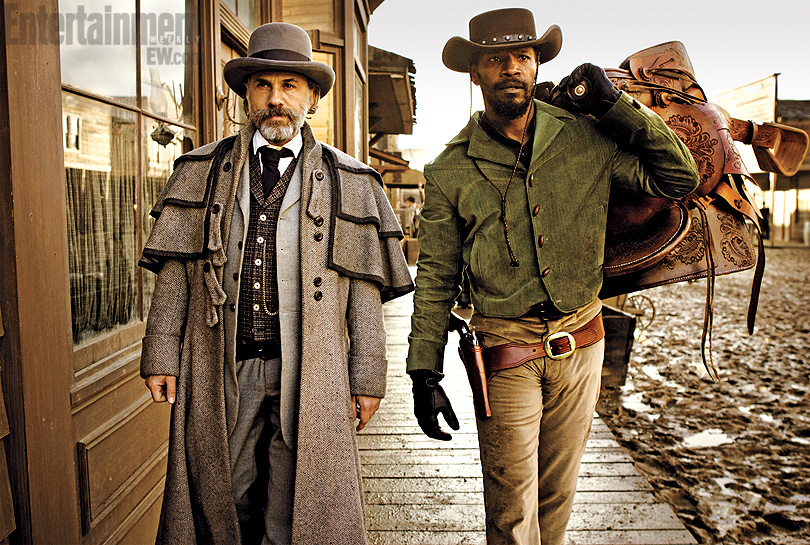Django Unchained
18Quentin Tarantino has always wanted to make a western; in fact it's fair to say that many of his films contain elements of the genre without being bone fide westerns. For his eighth full-length feature then, he finally hits the western trail with Django Unchained.
Of course, being Tarantino, it isn't quite that straightforward; he himself describes his western as a 'southern', as much of it takes place in the Deep South. And if you're looking for a hard fought tale between cowboys and Indians, you've come to the wrong saloon, as Tarantino takes off in a completely different direction.
Things are looking grim for Django (Jamie Foxx); he's being transported on foot, along with a number of other slaves, across some mean terrain by some even meaner cowboys.
Their journey is soon halted by a German dentist by the name of Dr King Shultz (Christoph Waltz). He asks Django's captors if he could have a word with him, as he believes he has some information that might help him out. They don't prove to be very helpful, so Shultz asks him anyway.
It transpires that Shultz is no longer a dentist, instead moving into the more lucrative bounty hunter business instead. He's after the notorious Brittle brothers, as there's a big bounty on all their heads. Problem is, he's never seen them. He's heard that Django has though, which he admits to. Shultz then offers Django a deal: if he helps to identify the brothers, his days of slavery are over. Of course Django accepts.
After spending a lot of time together, the pair soon become firm friends. When Shultz learns that Django is actually married, he decides that he will help reunite them both. But although the concept of slavery is a foreign one to German Shultz, it's still very much a way of life in the Deep South, and freedom can come at a heavy price indeed.

I thought you agreed to be Watson to my Holmes for this fancy dress party? I'm going to look a prize cock now. Thanks!
You would think that Tarantino would be right at home with the themes and motifs of the western, and to a certain extent he is. Django Unchained subscribes to the many hallmarks of the genre, living up to the widescreen panoramic vistas and well-trodden trails of westerns of old.
At the heart of the film are some terrific performances; there's no doubt that Waltz deserved his Best Supporting Actor Oscar for his role as Shultz; he delivers Tarantino's sharp dialogue with hugely personable charisma that keeps all eyes and ears on him every frame he's in. And then there's Leonardo DiCaprio who tears up the screen as the film's baddie, proving just how incredibly and diverse a talent he is.
Foxx does well too, but his heroic character, although aiming for iconic, does fall somewhat flat and instead ends up as being curiously generic.
The film doesn't have a true western baddie per se, as DiCaprio's character is more rogue-ish than all out despicable. The real villain of the piece is sadly Tarantino himself. The film is two hours and forty-five minutes long, which wouldn't necessarily be a problem if Tarantino had actually enough of a story to fill it. He doesn't. At times it ambles along like the wonkiest of donkeys, stopping far too frequently to relieve itself.
The notion of having a black slave as the hero is an interesting one for sure, but Tarantino doesn’t really expand upon it more than that.
Even his trademark set pieces are disappointing. Not only are they few and far between, but over far too quickly in a blink-and-you-miss-it fashion. They lack any sense of epic-ness and feel horse-shoed in just to appease an expecting Tarantino crowd. He can and has done far better in the past.
There's probably the makings of a truly great film in this plodding nag somewhere, but it certainly would have to have at least thirty minutes shaved off to keep it interesting.
Django Unchained is by no means a bad film, and let's face it, a bad Tarantino film will always be worth watching over the majority of standard Hollywood fare; it's just disappointing by his own high standards.
There is much to admire about it; it looks how you would expect a western to look; it also has, again as you would expect from Tarantino, an original and entertaining soundtrack. But it's not the post-modern, revisionist twist on the western many were hoping for. It certainly isn't in the same league as Eastwood's 1992 classic Unforgiven, which is a shame, because if anyone could have made the next great western, you would have bet the ranch on Tarantino. Unfortunately Tarantino's self-indulgence got the better of him, and these particular chains should definitely have been reined in.
